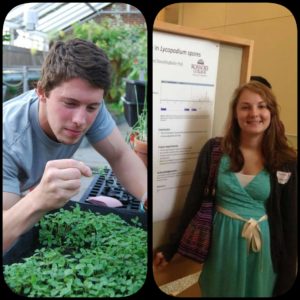
Pictured above: Benjamin Schwartz (left) and Sarah Petrosky (right)
The MARCUS conference (Mid-Atlantic Regional Conference for Undergraduate Scholarship) is an annual conference where students can present their research to other students, professors, and the public. In 2015, the conference was held at Randolph College on October 10th. The conference is multidisciplinary where students can share a topic using knowledge and methods from a variety of fields.
Benjamin Schwartz, ‘16, and Sarah Petrosky, ‘17, are two students involved in Dr. Poli’s Dragon Research Collaborative, a multidisciplinary research team focused on explaining some of the myths and traditions around dragons. Both students travelled to the MARCUS conference in October to present their research. Ben’s research investigated medicinal properties in “dragon plants” while Sarah’s research focused on the plant species Lycopodium digitalus and why the plant species is extremely flammable.
Both Ben and Sarah really enjoyed working with Dr. Poli on their research projects.
Ben Schwartz: “Working one on one with a professor is an extremely worthwhile experience. Through research, Dr. Poli has become more than just a supervisor to me. She provides me with just enough insight into my research protocol and technique that I am driven in the right direction, but also so that I am forced to critically think on my own and feel comfortable executing the experiment independently. Moreover, she is also a wealth of knowledge for my future ambitions. Harvesting a relationship like this with a professor is invaluable, and I will always hold close to me everything she has taught me.”
Sarah Petrosky: “I really enjoy working with Dr. Poli. For the most part, I work on my own while giving her frequent updates as to how my research is coming along. In my lab, it is a very independent process. I do not have scheduled time in a lab, just goals that I am required to meet on a weekly basis.”
Ben’s favorite part about working on his project was presenting at the conference.
“Some of the Dragon Research Collaborative traveled together to represent the team and spread the word about our interdisciplinary approach toward research. I enjoyed sharing my studies with people outside of Roanoke College and also learning about research that other schools provide.”
The toughest part about Sarah’s research project was managing the development of the plants.
“The plants I work with cannot be grown in a greenhouse. This means that the stages of development that I look at occur only once a year. The incredibly time-sensitive nature of my project, then, places a lot of pressure on me during the weeks of late August through early November, since I have to catch the plants at each stage in their development when it happens, or I would be unable to complete my protocol.”
Both Ben and Sarah recommend getting involved in research and offer their advice to anyone considering it.
Ben: “Whether you need experience for graduate school or employment after college, or if you’re just truly passionate about a subject and want to learn more, then you must get involved. It’s a win-win, you cannot go wrong.”
Sarah: “There are two big suggestions I have. The first one is, when you get involved in research, make sure your other schoolwork is manageable. This is more for your own health more than anything. Different professors run their labs different ways, but it is still a time commitment, and if you have overloaded on courses, it could get very overwhelming very quickly. The second one is, work with a professor that you like and that has a project that is of interest to you.”